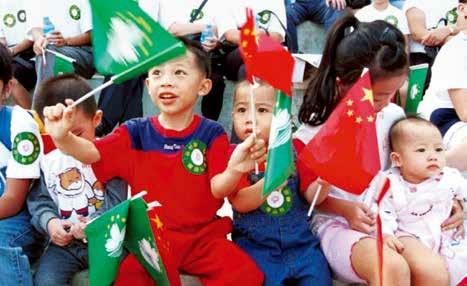Macao’s Return at 20:Reflections on Prosperity and Stability
2020-02-10byTianFeilong
by Tian Feilong
December 20, 2019 marks the 20th anniversary of Macaos return to the motherland. The two decades of development have made Macaos future brighter as the special administrative regions role and position in Chinas national macro strategy grew in prominence. Macaos potential and development space in terms of connecting China and the West in economics and trade, culture, science, technology and finance, as well as modernization of traditional Chinese medicine, have all been explored.
Macaos successful development is built on the “one country, two systems” principle. Just before Macaos return to the motherland, public security and the local economy were in a downturn due to weak governance, so it endured some social chaos during the transitional period.
However, under the “one country, two systems” principle and the Basic Law of the Macao Special Administrative Region (SAR), Macao enjoys full policy support of the central government and a high degree of autonomy granted by the Basic Law, including the power to independently formulate policies for the local entertainment industry.
Macaos development is affected by factors such as land resources, human capital, strategic planning and policy support. The central government and the neighboring Guangdong Province have provided a series of solutions through guidance and consultation under the framework of “one country, two systems”including the Hengqin Port, reclamation plans, sea jurisdiction and measures to streamline customs clearance, as well as policies to facilitate the development of Macaos advantageous industries and private entrepreneurship under the plan of the Guangdong-Hong Kong-Macao Greater Bay Area.
Under the framework of “one country, two systems,” the central government also actively supports Macao in developing regional characteristic industries and improving its international status. Specific measures include building an international leisure and tourism center, developing a Sino-Portuguese business and trade exchange platform and a Sino-Western cultural exchange platform, and fostering technological innovation and financial sector with regional characteristics.
Backed by the central government and facing a new pattern of globalization under the Belt and Road Initiative, Macao is continuing to tap and release the huge institutional dividends of “one country, two systems.” By merging its own development with national rejuvenation, it has exemplarily demonstrated the original intention and strong institutional vitality of the principle.
The “one country, two systems”principle with Macao characteristics has gradually accumulated unique experience over the past 20 years, enriching and developing the practice of the principle.
First, a stable political foundation of patriots and the patriotic identity of Macao as an “organizational society” are key to Macaos sound governance. Macao society has focused on the political goals of unity and effective accumulation before and after its return to the motherland, laying a reliable political basis for governance after the return.
Second, the formulation of Macaos Basic Law draws on the experience of Hong Kongs Basic Law and has its own independent ideas, which formed a more rigorous and reasonable system design for administration and democratic political system development. To some extent, this avoids the unfavorable situation of weak governance enabling the radical evolution of anti-establishment social movements.
Third, the national security legislation and legal system guarantees have been firmly enforced. The National Security Committee was established based on 23 pieces of legislation, which excluded foreign judges from hearing national security cases through judicial reform to firmly maintain national security.
Fourth, the funding system and scientific planning and management of Macaos foundations play an important supporting role in the development of Macaos humanities and social sciences, social undertakings and public education and opinion guidance, and effectively assist the government in achieving the goal of prosperity and stability.
Fifth, Macaos social security and welfare system effectively addresses problems related to peoples livelihood and protects vulnerable groups, creating an institutional effect of stabilizing social order and resolving social conflicts.
Sixth, Chinas national strategies and the central governments policy support and guidance not only benefit Macaos industry and residents, but also effectively integrate Macao into the countrys national governance system and big picture of development.
The 20th anniversary of Macaos return to the motherland presents an important occasion to reflect on Macaos experience with “one country, two systems” and compare it to that of Hong Kong to evaluate the impact of the institutional leverage of the reform and opening-up policy. Macaos high-degree of autonomy, prosperity and stability as well as continuous contributions to national development have been tested and proven over the past two decades. In the new era, national development needs to focus more on Macaos active alignment, participation and integration in the Belt and Road Initiative and the national strategy of developing the Guangdong-Hong Kong-Macao Greater Bay Area. This shift provides unprecedented opportunities but at the same time faces structural challenges related to deep integration of the “one country, two systems” principle.
Whether Macao can seize new opportunities afforded by Chinas national strategies over the next three decades and promote mutually beneficial, win-win and integrated development of itself and the rest of the country is a key question for adaptation and innovation in the era of building the Greater Bay Area. Macao can find the best institutional path to integrate into the overall situation of the countrys development and the trend of re-globalization by seizing the opportunity provided by this national strategy.
